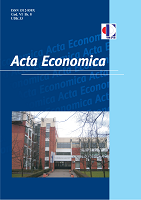ДЕФИНИСАЊЕ МОДЕЛА МЈЕРEЊА УСПЈЕШНОСТИ МЕНАЏЕРА У ЗЕМЉАМА У ТРАНЗИЦИЈИ
Defining model of grading success of manager in countries of transition
Author(s): Miladin JovičićSubject(s): National Economy, Supranational / Global Economy, Business Economy / Management, Developing nations, Economic development, Financial Markets, Accounting - Business Administration
Published by: Економски факултет Универзитета у Бањој Луци
Keywords: Transition; success; evaluated; levels; privatisation; management; model; comparation;
Summary/Abstract: Menagers of all levels are evaluated within the grades: exellent, good and bad. Exellent signifies a numerical indicator, wich is considerably below the average of grouping ti wich the company belongs. According to time dimension of observation and the menagement level, the most important indicators are: Short-term indicators for: a) top mengement- growth commerce and liquidity; b) intermediatelevel of management – turning of working capital and labour turnover; c) first level of management – workload according to those employed and the customer satisfaction. Long-term indicators for: a) top management share on the market and profitability: b) intermediante level of management – economy commerce and labour turnover; c) first level of management – the quality of quality of products and the number of tehnical inovations. The model is composed of a complex, but very clear and organised „instrument table” for detailed indicators of how the company does the business and whether it moves in the right direction, or in order words, what are its work management results like. The indicators of our model for measuring efficiency of manager word point out to the fact that is results of management of companies of countries which are in transition are by far behind the work efficiency compared to those in developed countries. Such poor results of our factory are consequences of: tehnical-tehnological falling behind, unfinished changes of property ratio, bad influence of politics into economy and low level of motivation of those empoyed. The way to positive results in this area here can come trough fasts institutional changes which before all need to happen in property ratio, the division of competence between management, administration structure and shareholders as well as bringing into practice the adequate indicators of successful manager work which the directors and the auditing board need to control and them the real owners of the company property.
Journal: Acta Economica
- Issue Year: 4/2006
- Issue No: 4
- Page Range: 163-179
- Page Count: 17
- Language: Bosnian, Croatian, Serbian

